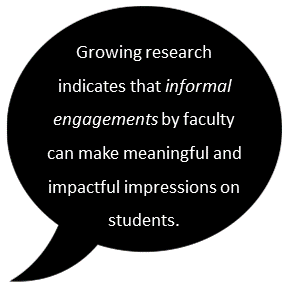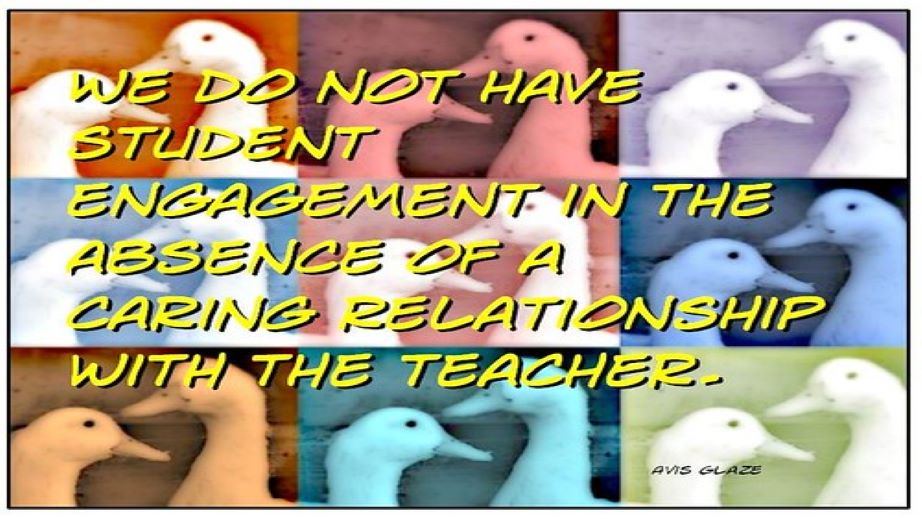Author(s): Dr. Jenny Sumner
Editor: Dr. Denise Lowe
Looking across the higher education landscape, I see a strong and growing focus on student success as a holistic approach by faculty and staff from across the campus. At my large, metropolitan university, there are many student services and support resources designed to support students’ retention, progression, academic success, and completion, both inside and outside of the classroom. In fact, when the global pandemic hit in spring, it was impressive to see how these services mobilized to ensure that students had the resources and supports that they needed to successfully continue their academic journey.
As a newer, online faculty member, I wonder how I may be able to engage more, both with and for my students, and to support them even beyond my classroom. Do you have any tips or suggestions as to how online faculty can become more involved in serving students in online programs?
Signed,
Eager to Engage
:
Dear Eager,
Great question! While, historically, the lines between faculty/academic affairs and student affairs were delineated, in recent decades there has been a shift toward partnering together to impact student success.
First, to be clear, faculty are already involved in student success! In fact, while “all institution constituents share the responsibility of enhancing retention and student success…faculty members play the single most important role in student learning and may have the greatest impact on student persistence.” (McCormick & Lucas, 2014). Faculty are the core of any institution’s mission, and faculty are on the front lines of student success by providing outstanding instruction and learning.
However, growing research also indicates that informal engagements by faculty inside and outside of the classroom can make meaningful and impactful impressions on students (These engagements can also be impactful on you, as well!). There are many opportunities for you, as a new, online faculty member to engage with and serve students in your online programs. In fact, I would argue that your involvement with students, especially online students, is a critical component to their success!
Here are some of my recommendations of how to engage differently with and for your online students:
#1: Demonstrate Approachability. This is the first step when engaging with your online student. While you may be an approachable person, students, especially online students, may be hesitant to approach you, or even know how to approach you. I would suggest that you experiment with innovative technologies and/or to work with an instructional designer to create fun and exciting ways to connect with your online students. Online students, who feel that they have a connection with their online faculty and that their online faculty cares about their success, are more apt to complete your class successfully, and reach out to you when other issues arise.

#2: Connect with Your Students Through Your Discipline. Survey research indicates that students, especially online students, value an understanding of how their course content/major content applies to their future goals. As the expert in your field, you have the unique opportunity to connect with your students through your discipline, engaging in activities ranging from low-time commitments to long-term relationships. As a faculty member, you could:
- Establish High Impact Practices (HIP) as curricular or co-curricular activities
- Serve on welcoming or orientation committees, and help to welcome new students to your campus and to your discipline/major
- Judge students’ presentations at symposiums/conferences
- Review students’ research proposal/thesis/dissertation
- Establish a “mentoring meeting” schedule where you meet with students informally to discuss varying topics of interest outside of the classroom
- Invite students to participate in your research activities
- Co-author a paper with your student(s)
- Serve as a faculty advisor to a student association, club, or organization
- Serve on a thesis/dissertation committee
- Serve as a formal faculty-mentor
#3: Partner with Key Resources on Your Campus. Institutions have many student affairs and student resource offices designed to support students in different ways at every point in their education journey; offices such as financial aid, accessibility, tutoring, counseling, wellness, career, experiential learning, and many more, offer wide-ranging and specialized services to students.
A great way to increase your involvement in support of your online students is to partner with these offices, and, together, create synergies for student success. Student affairs personnel need the knowledge of faculty, and their understanding of what students are experiencing in the classroom; conversely, faculty need the knowledge of student affairs professionals about what students are experiencing peripheral to their academics. Through cross-collaboration, we create holistic student supports.
#4: Get Engaged in the Conversations. Many departments support student success, and I would bet that your institution has many ongoing initiatives as well. Various committees, strategic teams, and work-groups develop to explore opportunities to enhance student success, and frequently lacking in these conversations is the voice of online faculty. I would encourage you—for professional development, networking, and outcome-focused reasons—to serve on and engage with these types of groups, and to share your insights from an online faculty perspective. I assure you that you would be a welcomed member to the conversation!
There are many ways to get involved with your online students and with others who are working across your campus to impact online student success. My hope is that you do, and that you have fun with it! This is certainly an exciting time to be in the online education space, and to creatively engaging on behalf of our online students!
I’m sure there are many more tips that others in the community have found useful. What strategies or recommendation do you have for how online faculty can get involved in supporting online students? Please share your thoughts with our TOPkit community on LinkedIn!
